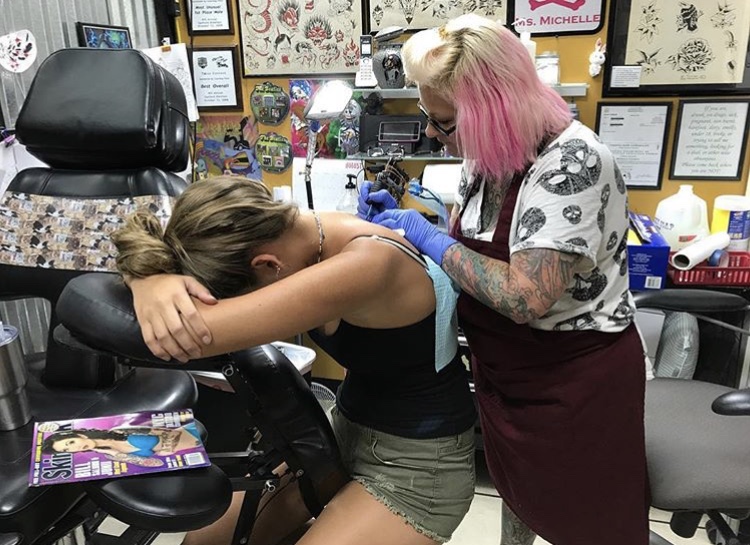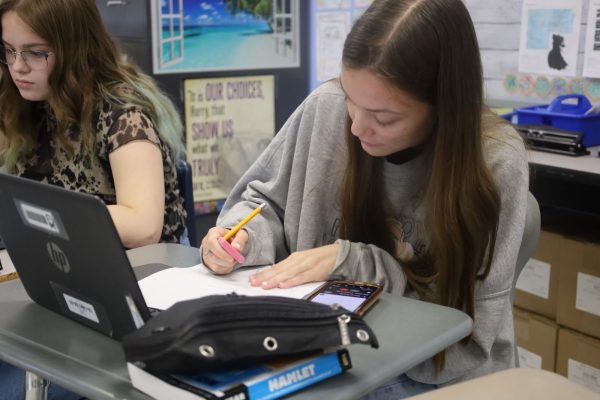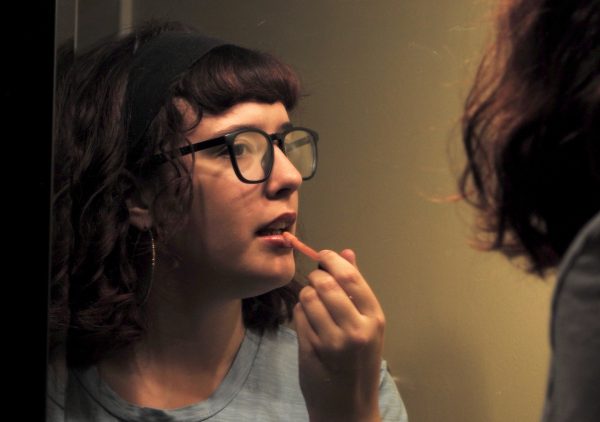Thinking and Inking
Given the stereotypes of teenagers with tattoos, people might think that every piece of ink on a teenager’s skin is the result of a mistake or a rebellion. In reality, many teenagers with tattoos have reasons and meanings behind the ink on their skin.
“Most tattoos contain a good story or memory that you want to keep with you at all times to remind you, or to keep a memory alive,” senior Jennifer Mustafa said.
Mustafa herself has a tattoo of a lotus flower at the top of her spine. On the stem of the flower in cursive, the tattoo reads “ohana,” accented by a wave. At the bottom, a heart ties the piece together.
“I wanted something on me to represent my family and a little of who I am,” Mustafa said.
Mustafa’s sister works as a tattoo artist and applied the tattoo. Before she began, Mustafa’s sister put a numbing cream on the area and let it sit for five minutes. Instead of the pain people would expect, Mustafa described the experience as similar to being written on by a marker or pen.
Senior Gabrielle Hackney describes the pain as slightly more intense, but far from agonizing. After getting three tattoos, Hackney describes the pain as “little bee stings” and refers to the whole experience as “very exciting.”
“Once you get one, you’ll want to get another,” Hackney said.
Hackney has a tattoo of a lotus flower on her back, a cross behind her ear and the words “walk by faith” on her foot. Meaningful words and phrases like that can hold deep meaning for students who get tattoos.
Senior Alexis Groenink has the words “love you GG” on her right foot, in honor of her great grandmother, GG, and who passed away in December. After her death, Groenink wanted a lasting and meaningful way to remember her grandmother.
“I chose this because it is pretty much permanent, and I didn’t want just a necklace or bracelet that could break in less than a year.” Groenink said.
Groenink’s cousin got the same tattoo, and the duo have worn the ink for almost a year. Even now, the words hold deep meaning, and remind Groenink of her.
“It helps me to express myself because I really loved my great grandma and this way I always have her with me,” Groenink said.
Once students have chosen a meaningful tattoo, there is still a lot to consider, from price to parlour to permanence to placement to parental consent.. Prices vary between artists and tattoos, but even a small tattoo can cost over $50. Even for those who can afford it, choosing the proper tattoo parlour is one of the most important parts of the process, as bad ink can last forever.
“Make sure you fully decide what you want,” Hackney said. “It’s permanent, there’s no going back.”
Parental consent may be the next hurdle for a student looking for a tattoo. Florida law requires anyone under 18 to have parental consent for a tattoo, and some students may find their parents unwilling to authorize such an important step. Even those parents who accept tattoos may have opinions on content or location.
“[My parents] didn’t want it to be in a super noticeable place, or in a place that looks unprofessional,” Groenink said.
Groenink’s parents allowed her to get the tattoo on her foot, where it would be easily hidden in a professional setting.Other parents may be more or less strict, depending on upbringing, strictness and personal opinion.
The location of a tattoo is not only important to parents, but can also be important to the student. Mustafa recommends not getting a tattoo on a bony area, and considering future career options. Since she wants to work or intern at Disney in the future, she opted for a tattoo that could be easily hidden under her shirt to comply with Disney’s policies.
“Beware of your placement,” Mustafa said. “And think of your future first, or job.”
For many students, getting a tattoo can be an emotional, meaningful, and thoughtful decision, one that is considered carefully. Even at a relatively young age, permanent ink can carry meaning weight and importance.
“It’s a form of art,” Groenink said.
Your donation will support the student journalists of Hagerty High School. We are an ad-free publication, and your contribution helps us publish six issues of the BluePrint and cover our annual website hosting costs. Thank you so much!







